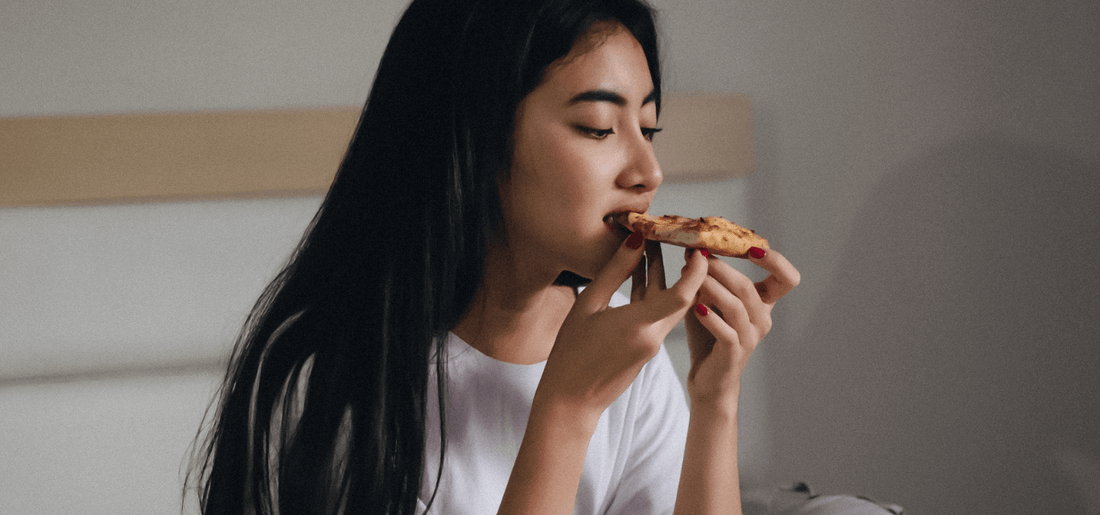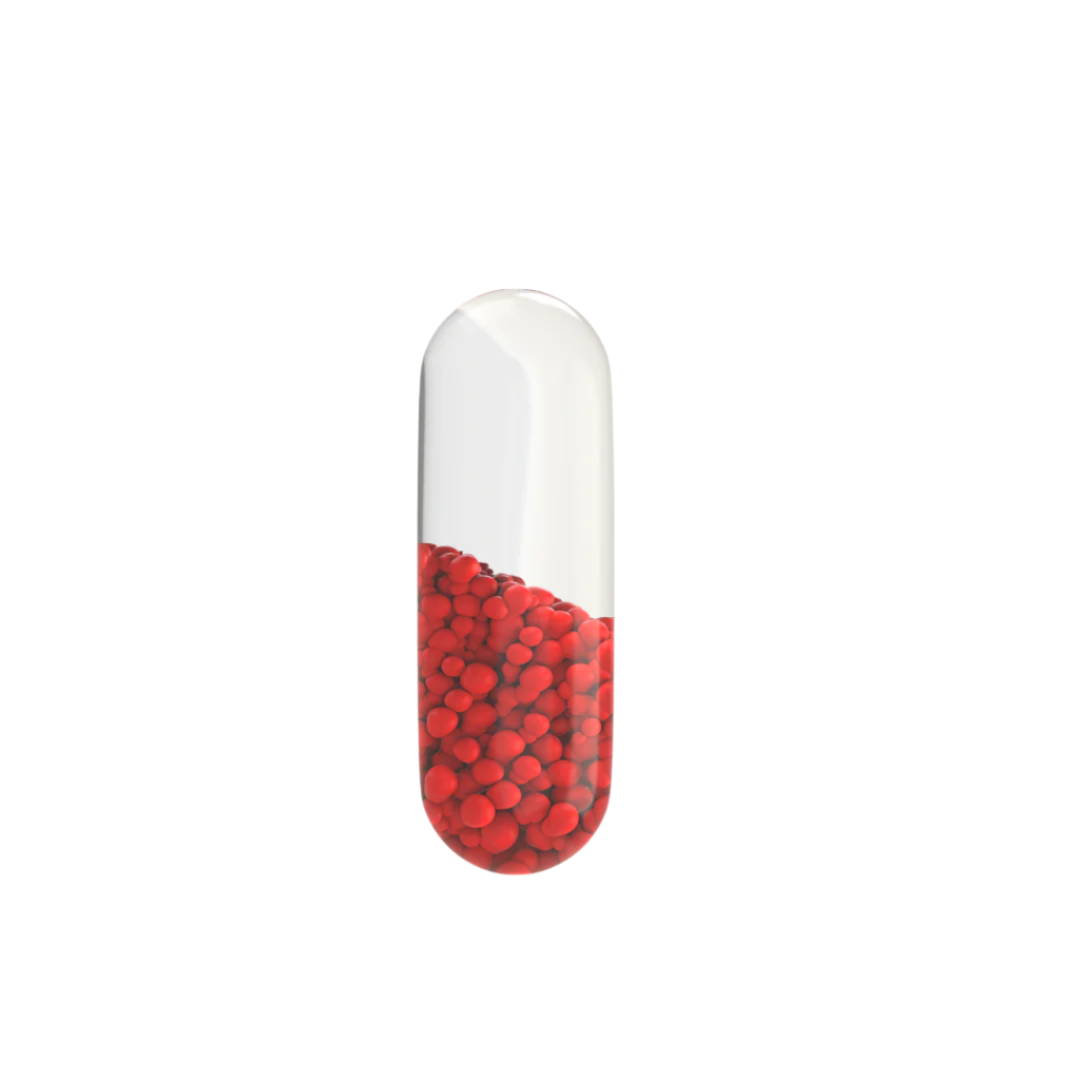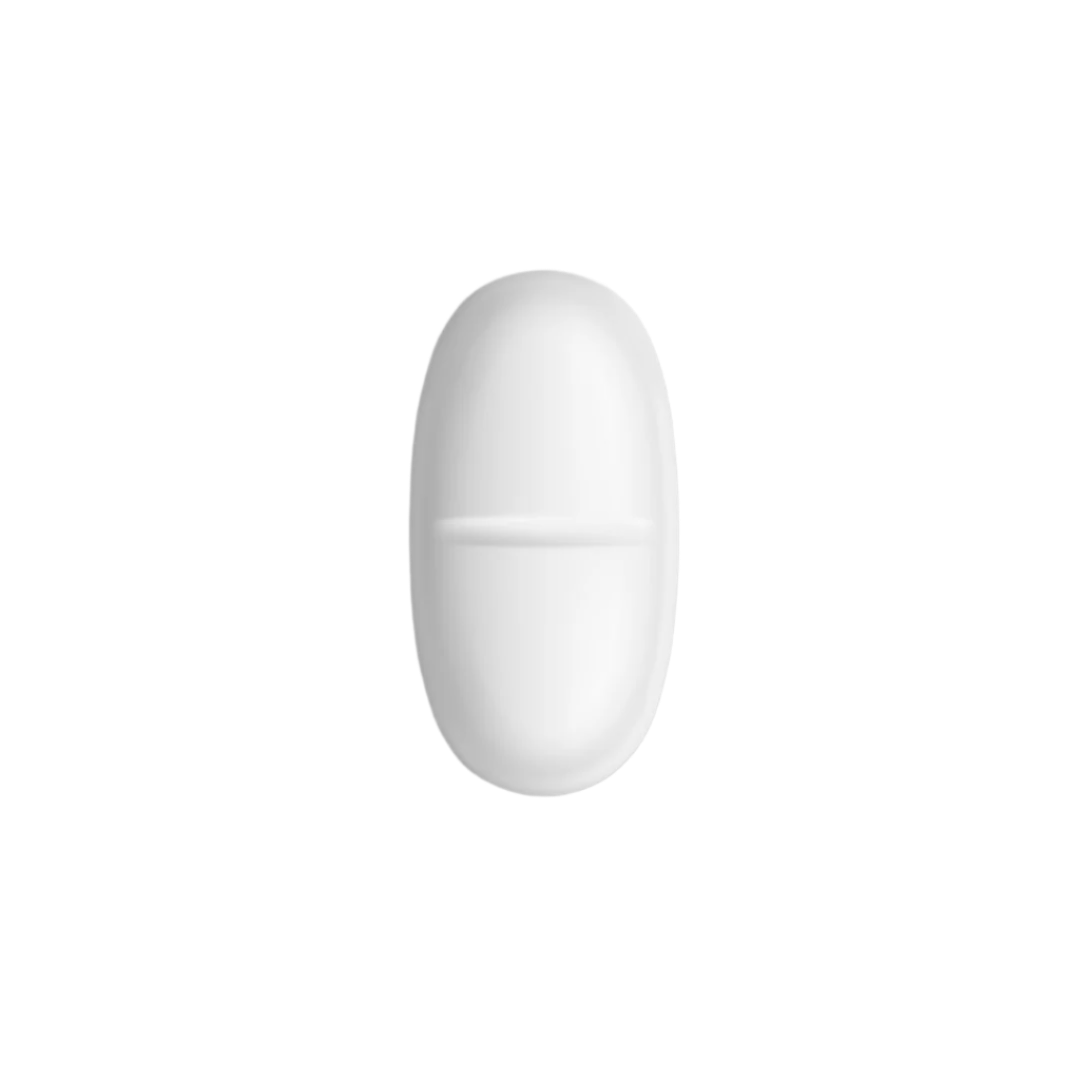When Should You Stop Eating Before Bed?

It’s intuitive that eating just before bed might affect sleep. Most of us have experienced the poor sleep that comes after an evening meal lasting later into the night than we’re used to, with indigestion causing tossing and turning and feeling uncomfortably full.
But recently there has been renewed focus on the question of how long you should leave between sleeping and eating. There are many studies drawing connections between late-night eating and weight gain1, with the evidence strongly supporting a link between the two, as well as evidence linking late-night eating and inefficient sleep2.
This can sometimes lead to the conclusion that eating before bed is always bad, or that the time at which you eat has such a powerful physiological effect that it overrides other factors like overall calorie intake, stress, or sleep deprivation.
However, correlation and causation can be misleading when it comes to this question. In this article we are going to explore:
- The evidence connecting night time eating and poor sleep
- The evidence connecting night time eating and weight gain
- How this evidence should be interpreted
- The important connections between sleep, nutrition and stress
- Why when you eat is not what most of us should focus on
It’s true that when you stop eating before bed is related to sleep and the potential to lose or gain weight, but not in the ways we might assume.
Night time eating and quality of sleep
Acid reflux is a common condition, with prevalence of 20% in the population of the United States3. If you suffer from acid reflux then it is recommended you leave at least three hours between eating and sleeping, with studies4 indicating that shorter dinner-to-sleep times are significantly correlated with more serious symptoms, which have a well-documented impact on quality of sleep5.
A three-hour dinner-to-sleep time is often recommended to the wider population too678. However, the guidance here is much less clearly defined and comes from less definitive evidence.
For example, a comprehensive article in the British Journal of Nutrition9 showed that eating or drinking less than an hour before bedtime is associated with increased sleep duration and WASO (wakefulness after sleep onset), which could be interpreted to mean that the eating itself was causing disrupted sleep. (The article clarifies that in this case increased sleep duration isn’t necessarily a good thing: “longer self-reported sleep duration could actually indicate efforts to compensate after the experience of more sleep difficulties, such as unsuccessful initiation or maintenance of sleep. The association we report between eating before bed and higher odds of WASO supports this interpretation”.)
But this study and others like it do not establish a causative link between the two. For example, individuals regularly eating late at night may well have poor sleep hygiene for other reasons – for example stress10, or a regularly disrupted daily routine.
While the evidence doesn’t suggest that eating late at night causes inefficient sleep, it does add to the picture of how routine and habits might more broadly be important to sleep, and more study into what causes dinner-to-sleep times to be correlated with sleep quality is likely to yield useful findings.
Night time eating and weight gain
The links between night time eating and weight gain are clear, with numerous studies111213 showing that people eating before bed are more likely to gain weight and that eating late at night is predictive of body mass index (BMI)14.
But again, the evidence collected on this topic does not demonstrate causation, and in fact there is no known physiological basis for weight gain as a result of eating shortly before sleep. While it’s commonly understood that a slower metabolism might lead to more fat storage (with fewer calories being burned for energy), nighttime basal metabolic rate is in fact very similar to daytime15. There are many things going on during sleep that require energy, and so energy use isn’t much reduced.
In this case it is easy to think of confounders affecting our ability to interpret this information. Late-night snacking adds additional calories to a daily nutritional intake, and doing this consistently will of course lead to weight gain. There is another confounder here too, and an interesting one very much related to sleep: stress.
Sleep, eating habits and stress
Instead of eating before bed being the cause of poor sleep, the reality might be the other way around. Sleep restriction has been linked to weight gain and late night eating16, with weight gain clearly attributed to the consumption of additional calories. Sleep restriction has also been linked to increases in ghrelin17, the “hunger hormone”, leading to overeating and calorie excess.
As well as this, stress has an impact on ghrelin levels18, and of course has a relationship with sleep1920. Individuals eating later may well be feeling the effects of poor sleep, as well as stress-related sleep issues, leading to increased “reward-based eating” – what is commonly referred to as “comfort eating”. Mindfulness exercises have not only been shown to improve sleep disorders like insomnia21, but also to reduce reward-based eating22, suggesting that some of the things we can do to improve sleep might also improve eating habits, and vice versa.
Sleep and nutrition as part of overall wellbeing
There isn't a simple answer to the question “when should you stop eating before bed”. While there is evidence linking sleeping and eating habits there isn’t a well-understood mechanism for why one might affect the other.
For most people, a snack just before bed isn’t going to do any harm. However, an important thing to take away from the evidence here is how much sleep and nutrition both affect overall wellbeing. Instead of thinking about the specific parts of our daily routines and biological processes it’s perhaps more effective to think more broadly about how we look after ourselves – how we manage stress, how we think about nutrition, and how we think about sleep. While it would be great if not eating before 8pm was the cure for insomnia and weight gain, it’s clear that there is usually something more fundamental to address if we want to improve our health and how we feel.
Prioritise good sleep hygiene
If you are wondering if your eating habits are affecting your sleep, it may be worth thinking more broadly about sleep hygiene before worrying too much about the specifics of evening meal times.
The core principles of good sleep hygiene can be found here, in our article which covers how to manage environmental factors and how to develop a healthy sleep routine. This article also covers additional information on how wake-up supplements like B・SYNC ON can improve your everyday mood and energy levels in the same way that good sleep hygiene can, but by helping with how you feel when you wake up, and by helping to reset your body clock, rather than directly tackling sleep issues.
With sleep so fundamental to our health and wellbeing, it makes sense to address it as a priority if you are worried about how your daily habits are affecting how you feel.
If you are using B・SYNC ON to support your natural sleeping and waking cycle, remember that you shouldn’t eat in the two hours before bedtime as doing so can cause B・SYNC ON to release into your system too quickly, waking you before you’ve had a full night’s sleep. We advise that B・SYNC ON users always ensure their last meal or snack is two hours or more before getting into bed and taking the supplement.
Sources
- https://pubmed.ncbi.nlm.nih.gov/25439026/
- https://www.cambridge.org/core/journals/british-journal-of-nutrition/article/associations-between-bedtime-eating-or-drinking-sleep-duration-and-wake-after-sleep-onset-findings-from-the-american-time-use-survey/72A5D22C25A35FA975A5B50991431E0C
- https://www.ncbi.nlm.nih.gov/books/NBK441938/
- https://pubmed.ncbi.nlm.nih.gov/16393212/
- https://www.ncbi.nlm.nih.gov/pmc/articles/PMC2879818/
- https://www.leesa.com/article/eating-before-bed-pros-and-cons
- https://pharmeasy.in/blog/how-long-should-you-wait-before-going-to-bed-after-dinner/
- https://health.clevelandclinic.org/is-eating-before-bed-bad-for-you/#:~:text=It's%20best%20to%20stop%20eating,go%20to%20bed%20feeling%20hungry.
- https://www.cambridge.org/core/journals/british-journal-of-nutrition/article/associations-between-bedtime-eating-or-drinking-sleep-duration-and-wake-after-sleep-onset-findings-from-the-american-time-use-survey/72A5D22C25A35FA975A5B50991431E0C
- https://www.sciencedirect.com/science/article/abs/pii/S1389945712000470
- https://pubmed.ncbi.nlm.nih.gov/25439026/
- https://pubmed.ncbi.nlm.nih.gov/23036285/
- https://pubmed.ncbi.nlm.nih.gov/23814334/
- https://pubmed.ncbi.nlm.nih.gov/21527892/
- https://pubmed.ncbi.nlm.nih.gov/18234245/
- https://pubmed.ncbi.nlm.nih.gov/23814334/
- https://www.ncbi.nlm.nih.gov/pmc/articles/PMC4688118/
- https://www.ncbi.nlm.nih.gov/pmc/articles/PMC5373497/
- https://www.sleepfoundation.org/insomnia/stress-and-insomnia
- https://pubmed.ncbi.nlm.nih.gov/34922108/
- https://www.health.harvard.edu/blog/mindfulness-meditation-helps-fight-insomnia-improves-sleep-201502187726
- https://www.ncbi.nlm.nih.gov/pmc/articles/PMC4799744/







